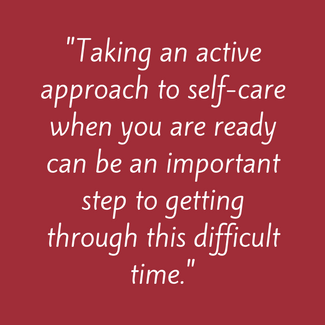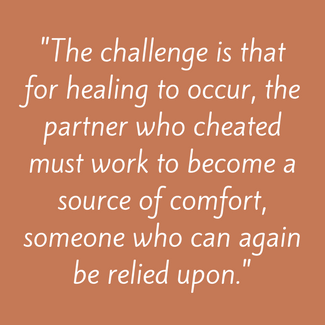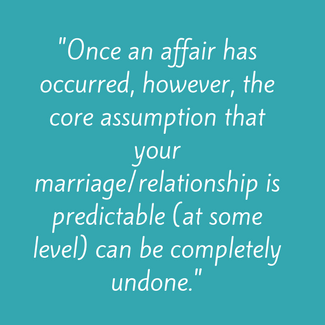Let the journey of self-discovery enrich your life...
Couples dealing with the aftermath of an affair are in turmoil. Turmoil that may make them question whether the marriage should continue. Turmoil that motivates some couples to seek counseling. 
The moment the affair was discovered, life as you knew it has been turned inside out. There is uncertainty about the future and doubts about the past (for instance, you might ask yourself whether there were other deceptions you didn’t know about, or you might sift through everything your partner has told you and weigh it with a new scale). This uncertainty can feel all-consuming and emotionally overwhelming.
The post-affair decision to start marriage/couples counseling can feel daunting. Ambivalence about whether to work it out and doubts that rebuilding can (or should) occur are to be expected. There may be moments when you want to reach out to your spouse/partner and make it work that are quickly replaced with the urge to end it all and start a new life on your own.
In the face of considerable uncertainty and distress, it can be helpful to have a general roadmap for affair-recovery counseling. While there is no one-size-fits-all approach to marriage/couples counseling, below are some of the counseling issues that often surface in my work with individuals and couples healing from infidelity.
Is therapy/counseling warranted at this time?
The first issue to decide upon is whether counseling should be started at this point in time.
It’s not uncommon for the betrayed spouse/partner to feel hopeless, doubtful that s/he can regain the trust that once existed. This is to be expected, and counseling can be helpful in sorting out these complicated emotions.
For affair-recovery to be given a fair chance, however, it’s essential that the affair relationship end completely. A no-contact rule should be put into place.
For the partner who cheated, it’s important that s/he do some significant soul-searching to determine whether or not there is motivation to do the work of repairing the marriage/relationship. This decision should not be borne out of the initial panic over the relationship ending, but rather, should be given a great deal of careful, sincere thought.
If the spouse/partner who cheated is committed to the challenging journey ahead, then counseling can start (even if the betrayed partner remains ambivalent at this time).
Stabilizing the crisis
The whirlwind of disbelief, deep sadness and intense anger disrupts your emotional equilibrium as well as the marital/relationship foundation. The betrayed spouse/partner is battered by conflicting needs: the need to move toward the other to find out what happened and why it happened, alongside the need for self-protection, a self-protection that drives you to turn away and close yourself off from the person who just injured you.
Competing needs and intense feelings can make the relationship highly tumultuous at this time.
Conversations about the affair often spiral into heated arguments. At some point the couple may pull away from each other in order to feel less pain. Discussions about the affair are highly distressing as more details are disclosed and the extent of the secrecy, lies and coverup becomes apparent.
One goal of this early phase of the counseling is to bring structure and emotional containment to the relationship. Coping strategies that center on self-care, emotional grounding techniques and a deliberate slowing down of the communication process are a few interventions that can be helpful.
Self-care for the betrayed
The knowledge of an affair is traumatic, and it’s common for the betrayed partner to experience significant emotional distress. Because of this, the counseling should include a plan for self-care.

This might involve individual therapy to help you work through the pain of the betrayal. Suggestions that others have found helpful include: journaling, reaching out to a supportive person, going for walks, finding tasks to temporarily occupy your mind in order to get a respite from intrusive thoughts about the affair, using painting/drawing to express the range of emotions you are experiencing, taking “mental health” time off from work, yoga, meditation or prayer.
There is no magic solution that will undo the turmoil that often results from an affair.
But taking an active approach to self-care when you are ready can be an important step to getting through this difficult time. If you are battling depression or feel too emotionally depleted and exhausted to try anything, giving yourself the space to do nothing might be exactly what you need at this time. And when you are ready, think small (remember, small steps start to add up pretty quickly).
Creating relational conditions for emotional safety & trust to reemerge
When the foundation of trust is pulled out from under you, debilitating insecurities may result. Anxiety can take over. You may feel “needy” in uncharacteristic ways. You might want your spouse/partner to account for every moment the two of you are apart. You may question whether s/he still loves you. You may doubt that s/he finds you attractive. You might feel held hostage by the fear of it happening again.
At the early stage of the recovery process, this is to be expected.
A central part of affair-recovery counseling is to help you and your partner develop routines and new ways of relating in order to slow down and ultimately reverse the landslide of insecurities caused by the shattering of trust. For this to occur, it is vital for the partner who cheated to make him/herself emotionally available, possibly in ways that may not have ever existed in the relationship prior to the affair.
Because of the affair, the person who cheated has become a symbolic threat. Every time the two of you are apart, there is the threat of another betrayal, of secrecy and lies. Reassurances may do little to calm the fears of the betrayed partner. The challenge is that for healing to occur, the partner who cheated must work to become a source of comfort, someone who can again be relied upon. This, of course, is no easy task. It’s a process that will take time. Patience and the intention to stay on track even when the road gets bumpy are key.

Remember, the post-affair healing process is about rebuilding trust. Without this foundation, you will never be able to relax into the relationship by making yourself vulnerable. And without this foundation, insecurities will continue to plague you.
Dealing with backsliding
The healing-rebuilding journey is seldom a smooth, linear process. It’s important to have realistic expectations about what’s ahead so that you can regroup when you hit rough patches. These are inevitable, so it’s important to plan for them, something the counseling should focus on when necessary.
It’s common to have periods of calm and greater emotional connection interrupted by an epic argument about the affair. This is because there will be reminders of the betrayal. You’ll be moving forward and feeling better only to be unwittingly triggered and flooded with pain. And in these moments your pain may feel as fresh as when you first discovered the affair. At these times it can feel like you haven’t made any progress.
While you may feel increasingly hopeless when triggered, it’s important to note that the triggering may be a sign that further processing of the affair trauma is needed. And further processing can lead to further healing.
The counseling can help you better understand the role of triggers in the healing process, how to predict them, and what they ultimately mean for your recovery process.
Exploring why the affair happened
At some point, the question of why the affair occurred becomes a central focus of the counseling. In fact, it may feel impossible to hold off asking the person you love and trusted, “Why did you do this to me?!”
You want answers.
When we experience painful events, the mind tries to impose organization upon emotional chaos. That means looking for reasons for/causes of the traumatic event.
In her book, Shattered Assumptions, Ronnie Janoff-Bulman describes how we make sense of the world through the assumptions we’ve internalized. These deep-seated assumptions ground and orient us — they help us place order and meaning on events, including our relationships.
One assumption that we often hold is that the world we navigate through is predictable. Take a moment to reflect on this assumption and imagine what it would be like to be someone who expects that s/he will never be able to predict anything with any accuracy. In short, nothing that you do would influence the conditions (the predictability) of your life.
If this were the case, you couldn’t count on anything. You’d expect to meet complete randomness at every turn. This, of course, would feel completely overwhelming. So most of us have learned to rely on the assumption that our life is relatively predictable (for instance, our car will start when we turn the key; our home will be there when we return from work; if we exercise and eat right, our health will improve, and so on).

Once an affair has occurred, however, the core assumption that your marriage/relationship is predictable (at some level) can be completely undone. And with this undoing, it can feel like there is little to ground you emotionally.
Understanding the “why” of the affair-trauma can bring back the emotional grounding of predictability: “If I know what caused the affair, why it happened, then we can address the cause and it won’t happen again.”
With understanding comes the possibility of identifying any potential problems that may reemerge in the future. And it’s important to note that this understanding should allow the person who cheated opportunities to learn about him/herself, to discover areas of emotional vulnerability that may lead to acting-out in some self- and relationship-destructive way.
Grieving the old, defining the new
The pain of infidelity is the pain of loss. The marriage/relationship as you knew it has been altered. The person you thought you new better than anyone may now feel like a stranger, someone who can hurt you in unthinking ways.
Grieving is part of the healing, and it’s important for the betrayed individual to feel that a safe and accepting space is being created in which this process can unfold.
At some point, the couples I work with that are healing from an affair frequently report that they are now talking in ways they never had before. Courageous conversations are taking place. These are conversations that are intentional, they reflect new communication patterns that prioritize connection even in the face of emotional discomfort.
These conversations also place a high value on emotional repair after a disconnection has occurred. Rather than falling away from each other, a new way of relating is occurring, a way of relating that allows for disagreements (and sees the value in them), relating that offers opportunities for repair-reconnection to occur after communication has stalled.
I often encourage couples to define what they want their new post-affair marriage/relationship to look like, to be clear about what the needs are of the relationship, and what each person needs in order to refuel as individuals. In this part of the counseling, each person is working to shape the post-affair relationship, creating something new while grieving what was lost.
~~~
The above items do not represent an exhaustive list; rather, these are some of the themes that come up in my work with couples in affair-recovery counseling.
The counseling process itself isn’t linear. It’s common to find yourself circling back and forth between themes/issues that were already explored. Repetition is commonplace when working through painful emotions and rebuilding trust.
This repetition can be frustrating, but it’s a necessary part of the healing. This is why patience is required.
Finally, while the counseling process may not be linear, it’s important that it does make sense to you. You should have the freedom to bring questions about the process to your therapist, and s/he should be open to sharing her/his thoughts about the process whenever you ask.
Are you interested in working with Dr. Nicastro?
Rich Nicastro, PhD is a clinical psychologist based in Austin, Texas. Dr. Nicastro has twenty-five years of experience working with individuals and couples, as well as offering psychodynamic supervision/consultation to other therapists.
He offers online individual and couples counseling (teletherapy) for residents of Texas.
**In addition to Texas, Dr. Nicastro is now offering teletherapy to people residing in Alabama, Arizona, Arkansas, Colorado, Connecticut, Delaware, Florida, Georgia, Illinois, Indiana, Kansas, Kentucky, Maine, Maryland, Michigan, Minnesota, Missouri, Nebraska, Nevada, New Hampshire, New Jersey, North Carolina, Ohio, Oklahoma, Pennsylvania, Rhode Island, South Carolina, Tennessee, Texas, Utah, Virginia, Washington, Washington DC, West Virginia, Wisconsin, Wyoming.**
Contact Dr. Nicastro to discuss your counseling needs. He can be reached at (512) 931-9128 or rich@richardnicastro.com



